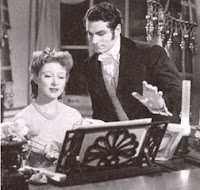
Captain Frederick Wentworth! The man whose heart was ever faithful to the woman he loved--even when she rejected him!
Captain Wentworth returns from a successful sea-voyage--now quite wealthy, but still broken-hearted about how he was treated by Anne Eliot (who was persuaded into rejecting his offer by her godmother).
Captain Wentworth returns to Kent to see Anne. Even though he has been deeply wounded, he cannot help but continue to love her:

"You pierce my soul. I am half agony, half hope. Tell me not that I am too late, that such precious feelings are gone for ever. I offer myself to you again with a heart even more your own than when you almost broke it, eight and a half years ago. Dare not say that a man forgets sooner than woman, that his love has an earlier death. I have loved none but you. Unjust I may have been, weak and resentful I have been, but never inconstant." --Persuasion Chapter 23.
Now, if a young man today were to say that to a young lady today, she would probably cry, because either a) she was very happy that she knew and liked such a romantic young man or b) she was very sad that she liked a young man who thought he was living in the 19th century :)
Either way, it is a very romantic thing to say...










